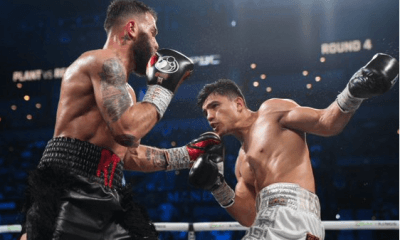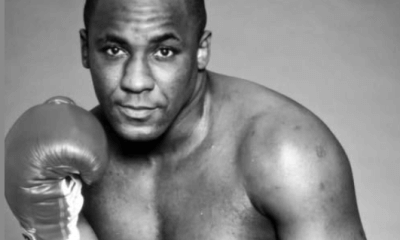Articles of 2007
Backwards and Side-To-Side, Always
The final round: Ibragimov, moving around the ring, going backwards to avoid a tear-up, throws a quick flurry at the shopworn American who then throws back and moves away. Ibragimov returns to moving backwards, avoiding a tear-up, shifting now and then left and right to deflect whatever trouble may be coming his way.
It is easy and in most cases lazy to define boxing as a dying sport when fight scenes beyond America are so buoyant yet the heavyweight division, boxing’s flagship, manages to singlehandedly undo the good work of a dozen quality match-ups in the lighter thresholds.
Evander Holyfield challenged for Sultan Ibragimov’s WBO world heavyweight title in Moscow on Saturday night, losing by unanimous decision in what was a boring, dull travesty of a ‘world’ title fight. Holyfield is forty-four years old, a ring warrior whose skills and physical abilities have diminished to scary level. The boxing ring is no place for old men yet Atlanta’s son still believes despite all the evidence to the contrary that he has something to offer to the sport and continues to step out under the spotlights and take hard, repeated punches to the head from men a decade his junior.
Common sense and medical science tells us the human brain is not designed to take repeated heavy blows and despite his proclamation that he only sees his ending in boxing as being the man holding the undisputed heavyweight title, every bout he takes and blow he ships to his aging body borrows against his future wellbeing.
The chance to fight for the WBO bauble came when Ruslan Chagaev, the WBA titleholder, pulled out of a unification with Ibragimov. This was only made possible through the comeback fights Holyfield has had in Texas over the last year against the handpicked opposition of Jeremy Bates (21-11-1), Fres Oquendo (26-3), Vinny Maddalone (27-3) and Lou Savarese (46-6). Despite going 4-0 (2), Holyfield has still looked old and stiff and the excuse of a damaged shoulder which supposedly accounted for the 5-2-1 record between 1999 and 2004 that saw many call for his retirement seemed just that – an excuse.
But this is boxing, and a former champion with diminished skills is more marketable than an untested young contender. So Holyfield flew to Russia, and it seemed ironic that a country stereotypically seen as cold and bleak would serve as the epitaph to the Real Deal as the curtains began to draw finally on his long career.
In the opposite corner was Sultan Ibragimov, and not much is known about him except that he only took up boxing at the age of seventeen, won a silver medal in the Olympics and is seen as part of the Eastern Bloc of fighters that between themselves have vacuuming up the four world heavyweight titles. Ibragimov had won his strap from Shannon Briggs in Atlantic City in a dull heavyweight contest that answered few questions but questioned more answers.
Ibragimov, not a big heavyweight, came to the ring weighing 218lbs, a measure that ranks him as small in comparison to the dreadnoughts around him holding similar titles. Holyfield came in at a surprising 211lbs, his lightest weight in eleven years, and it seemed possible that anticipating a lack of stamina in the later rounds, Holyfield had resorted to more roadwork during training as if harder work in the gym would reverse the aging process, and the increased cardio has caused him to shed much-needed weight.
Holyfield came to the ring under the shadow of allegations regarding the misuse of HGH and steroids, and his ongoing suspension in the state of New York following the embarrassing loss to Larry Donald in 2004.
Both issues have been easily circumvented by Holyfield having his most recent fights in Texas. Under current US boxing law, all states must recognise any medical suspensions placed on a fighter by another state. NYSAC originally placed Holyfield on indefinite medical suspension in 2004 citing his ‘diminished skills’.
Later, when NYSAC changed the nature of his suspension from a medical one to an administrative one after extensive medical testing, Holyfield became free to fight anywhere, and chose Texas, a state that incidentally has no mandatory testing for banned substances for fights in Dallas, San Antonio, Corpus Christi and El Paso.
The fight in Moscow lacked drama as both fighters seemed unwilling to press the other. Holyfield seemed to be taking the initiative by continually backing up Ibragimov but he seemed unable to do little more than throw the occasional tentative jab followed by the even more occasional cross or hook. Ibragimov did a little more, and it was probably this that won him the fight although the continual moving backwardsmade Ibragimov look more like a champion of caution than of men. A body shot early in the third seemed to momentarily slow the American but the Russian seemed gun-shy and afraid of copping a lucky shot.
A cynical mind would have said Ibragimov was more wary of the embarrassment of being knocked out by a man clearly past it than any potential dazing.
Holyfield smiled ruefully as the verdicts were announced, and Ibragimov won on all three cards. Chuck Giampa scored it 118-110, with Ruben Garcia and Tom Miller having it closer at 117-111. The old warrior automatically answered questions of retirement with “The important thing is I showed improvement and adjustment. He got the decision and I have to go back to the drawing board.”
Without wanting to sound cruel to either Ibragimov or Holyfield, the fight in Moscow is a mere sideshow to whatever future the heavyweight division has. Ibragimov lacks the size to challenge the bigger titleholders, and seemed reluctant to display whatever skills he has in this, the biggest platform of his career. His remarkable caution when facing such a fossil, especially an undersized one in Holyfield, does little to suggest that he would not be afflicted with such an approach when facing opponents who will outweigh him.
It would be facetious to suggest that Holyfield retire now considering he should have been retired years ago, and sadly he will probably carry on in his fervent belief that he still has enough to compete though his vigour has long vanished. Boxing has a home for old warriors who refuse to give up, and it is a cruel one, appearing in a fighter’s middle age, long after the arenas have emptied and the lights dimmed.
A forty-four year old man in with an athlete in his prime is wrong, even if the latter gives the demonstration of his skills that Ibragimov did in Moscow. But to suggest that boxing is in moral decay is wrong; it has always been like this. Apathy and greed made it this way a long time ago. Old fighters will continue to step into rings long after their competitive fires have burned out in ill-advised pursuits of money or glory. That’s just the way it is, has been and always will be.
The final round –moving back to avoid anything coming forwards, side-stepping and sliding to avoid getting caught. Backwards and backwards, sometimes a step left and sometimes a step right.
Never anything but backwards and side-to-side, backwards and side-to-side.
Read more from this fine writer at:
http://www.myspace.com/happytobehereoranywhere
-

 Featured Articles4 weeks ago
Featured Articles4 weeks agoA Night of Mismatches Turns Topsy-Turvy at Mandalay Bay; Resendiz Shocks Plant
-

 Featured Articles2 weeks ago
Featured Articles2 weeks agoAvila Perspective, Chap. 330: Matchroom in New York plus the Latest on Canelo-Crawford
-

 Featured Articles1 week ago
Featured Articles1 week agoVito Mielnicki Jr Whitewashes Kamil Gardzielik Before the Home Folks in Newark
-

 Featured Articles4 weeks ago
Featured Articles4 weeks agoRemembering the Under-Appreciated “Body Snatcher” Mike McCallum, a Consummate Pro
-

 Featured Articles4 weeks ago
Featured Articles4 weeks agoAvila Perspective, Chap 329: Pacquiao is Back, Fabio in England and More
-

 Featured Articles3 weeks ago
Featured Articles3 weeks agoOpetaia and Nakatani Crush Overmatched Foes, Capping Off a Wild Boxing Weekend
-

 Featured Articles3 weeks ago
Featured Articles3 weeks agoFabio Wardley Comes from Behind to KO Justis Huni
-

 Featured Articles2 weeks ago
Featured Articles2 weeks agoCatching Up with Clay Moyle Who Talks About His Massive Collection of Boxing Books















